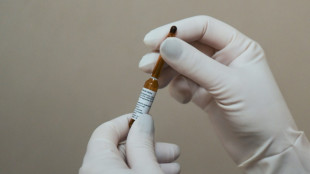
| CMSD | -1.2% | 22.401 | $ | |
| GSK | -5.29% | 37.05 | $ | |
| SCS | -2.68% | 10.46 | $ | |
| BCC | -2.59% | 92.24 | $ | |
| NGG | -3.26% | 67.2 | $ | |
| RIO | -6.39% | 54.92 | $ | |
| CMSC | -0.72% | 22.1 | $ | |
| AZN | -6.13% | 69.65 | $ | |
| RBGPF | 1.48% | 69.02 | $ | |
| JRI | -6.57% | 12.03 | $ | |
| BCE | 1.31% | 22.96 | $ | |
| RYCEF | -14.22% | 8.58 | $ | |
| BTI | -3.53% | 40.49 | $ | |
| BP | -9.43% | 28.64 | $ | |
| VOD | -8.76% | 8.615 | $ | |
| RELX | -4.49% | 49.23 | $ |

EU eyes autumn approval of Pfizer jab for Covid variants
The EU's medicines watchdog said Wednesday it aims to approve this autumn a Pfizer/BioNTech Covid vaccine adapted for two fast-spreading subvariants of the Omicron strain.
Milder but more infectious than earlier types of the Covid virus, the BA.4 and BA.5 types have helped to drive a wave of new cases of the disease in Europe and the United States.
The European Medicines Agency (EMA) said it had launched a review on Monday of an adapted version of the Pfizer jab targeting those two types, which are more transmissible and immune evasive than earlier variants.
"EMA is expecting to receive an application for the BA.4/5 adapted vaccine developed by Pfizer/BioNTech, which will be evaluated for a potential rapid approval in the fall," an EMA spokesman told AFP in an emailed statement.
That would come "shortly after" the expected approval of two other adapted vaccines by Pfizer and its rival Moderna, which target both the original Covid virus and the earlier BA.1 subvariant of Omicron, the spokesman said.
Both Pfizer and Moderna had lodged separate applications for approval of those vaccines on July 22, the spokesman added.
The EMA, which oversees medicines for the 27-nation European Union, has previously said the first Omicron-adapted jabs could be approved as early as September.
- 'Nowhere near over' -
While vaccines have helped lower hospitalisations and deaths from Covid, which first emerged in China in late 2019, the current jabs are mainly aimed at the earlier strains of the disease.
The World Health Organization warned in July that the pandemic was "nowhere near over", due to the spread of Omicron subvariants and to the lifting of control measures.
Covid cases rose around the world in late spring and early summer, driven by the new variants, but have since started to plateau in Europe.
European nations are now starting to look ahead to the autumn and winter season, when cases are expected to peak once more.
The EU said on Tuesday it had agreed with Moderna to delay vaccine deliveries scheduled for the summer to wait for jabs that are adapted for new Omicron variants.
The WHO and the EU's health and medicine agencies have meanwhile all recently recommended a second booster shot for older people.
The BA.4 and BA.5 variants were first discovered in South Africa and spread rapidly despite high population immunity conferred by prior waves and vaccinations.
Like other Omicron variants, they tend to have a milder disease course as they settle less in the lungs and more in the upper nasal passages, causing symptoms like fever, tiredness and loss of smell.
Ch.Buidheach--NG



